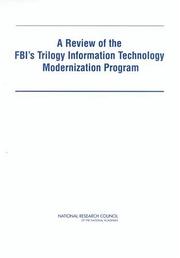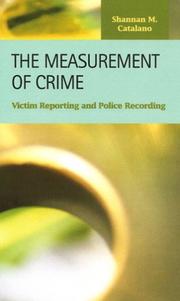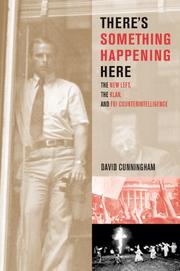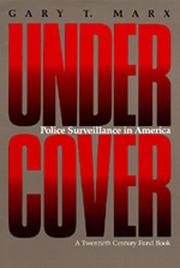| Listing 1 - 10 of 40 | << page >> |
Sort by
|
Book
ISBN: 0520962427 9780520962422 9780520287273 0520287274 9780520287280 0520287282 Year: 2017 Publisher: Oakland, California
Abstract | Keywords | Export | Availability | Bookmark
 Loading...
Loading...Choose an application
- Reference Manager
- EndNote
- RefWorks (Direct export to RefWorks)
The Federal Bureau of Investigation has had a long and tortuous relationship with religion over almost the entirety of its existence. As early as 1917, the Bureau began to target religious communities and groups it believed were hotbeds of anti-American politics. Whether these religious communities were pacifist groups that opposed American wars, or religious groups that advocated for white supremacy or direct conflict with the FBI, the Bureau has infiltrated and surveilled religious communities that run the gamut of American religious life. The FBI and Religion recounts this fraught and fascinating history, focusing on key moments in the Bureau's history. Starting from the beginnings of the FBI before World War I, moving through the Civil Rights Movement and the Cold War, up to 9/11 and today, this book tackles questions essential to understanding not only the history of law enforcement and religion, but also the future of religious liberty in America.
Law enforcement --- Religion and law --- Enforcement of law --- Criminal justice, Administration of --- Religious aspects. --- United States. --- FBI --- FBR --- Federal Bureau of Investigation (U.S.) --- Federalʹnoe bi︠u︡ro rassledovaniĭ v SShA --- Policing --- 9 11. --- american religious life. --- discriminatory investigations of religion. --- fbi and 911. --- fbi and religion. --- fbi investigating muslims. --- fbi religious communities. --- fbi. --- federal bureau of investigations. --- federal investigations into religion. --- history of law enforcement. --- investigating religion. --- investigating religious communities. --- pacifist groups in america. --- post 9 11 fbi. --- religious based investigations. --- religious freedom in the us. --- religious groups in america. --- religious white supremacy.

ISBN: 1280246510 9786610246519 0309597102 9780309597104 0309532485 9780309532488 0309092248 9780309092241 0309182352 9780309182355 9781280246517 6610246513 Year: 2004 Publisher: Washington, D.C. National Academies Press
Abstract | Keywords | Export | Availability | Bookmark
 Loading...
Loading...Choose an application
- Reference Manager
- EndNote
- RefWorks (Direct export to RefWorks)
Book
ISBN: 1281128341 9786611128340 0814429580 9780814429587 9781281128348 6611128344 Year: 2006 Publisher: New York AMACOM
Abstract | Keywords | Export | Availability | Bookmark
 Loading...
Loading...Choose an application
- Reference Manager
- EndNote
- RefWorks (Direct export to RefWorks)
In the three years following the September 11th, 2001, terrorist attacks, the Federal Bureau of Investigation hired 2,200 new Special Agents. But that was out of more than 150,000 applicants, and you can be sure the successful candidates had not only relevant backgrounds, but also determination and a genuine desire to embark on one of the most coveted, rewarding, and challenging careers in the world. The FBI Career Guide spells out exactly what the Bureau is looking for in Special Agent candidates, and how to maximize your chances of being selected from the huge applicant pool.
United States. --- Vocational guidance. --- Officials and employees. --- FBI --- FBR --- Federal Bureau of Investigation (U.S.) --- Federalʹnoe bi︠u︡ro rassledovaniĭ v SShA
Book
ISBN: 9781626377806 1626378010 Year: 2019 Publisher: Boulder ; London : Lynne Rienner Publishers, Inc.,
Abstract | Keywords | Export | Availability | Bookmark
 Loading...
Loading...Choose an application
- Reference Manager
- EndNote
- RefWorks (Direct export to RefWorks)
Initiated in the aftermath of the September 11 terrorist attacks, have the reforms of the US intelligence enterprise served their purpose? What have been the results of the creation of the Department of Homeland Security, the Office of the Director of National Intelligence, and a reorganized FBI? Have they helped to reduce blind spots and redundancies in resources and responsibilities . and to prevent misuses of intelligence and law enforcement? How did a disaster like the Snowden scandal happen? Darren Tromblay answers these questions in his thorough, often provocative, assessment of post–9/11 US domestic intelligence activities in the pursuit of national security.
INTELLIGENCE SERVICE--USA --- National security --- Domestic intelligence --- Domestic national security intelligence --- Intelligence service --- Homeland defense --- Homeland security --- United States. --- FBI --- FBR --- Federal Bureau of Investigation (U.S.) --- Federalʹnoe bi︠u︡ro rassledovaniĭ v SShA --- DHS

ISBN: 1593322550 9781593322557 1593321554 9781593321550 Year: 2006 Publisher: New York LFB Scholarly Pub. LLC
Abstract | Keywords | Export | Availability | Bookmark
 Loading...
Loading...Choose an application
- Reference Manager
- EndNote
- RefWorks (Direct export to RefWorks)
Book
ISBN: 9780748670543 0748670548 9781299105706 129910570X 9780748670550 0748670556 9780748670567 0748670564 9780748670536 074867053X Year: 2013 Publisher: Edinburgh Edinburgh University Press
Abstract | Keywords | Export | Availability | Bookmark
 Loading...
Loading...Choose an application
- Reference Manager
- EndNote
- RefWorks (Direct export to RefWorks)
This study of twentieth-century American poet Muriel Rukeyser explores the multiple avenues of her 'poetics of connection' to reveal a profound engagement with the equally intertextual documentary genre. It examines previously overlooked photo narratives, poetry, prose and archival material and demonstrates an enduring dialogue between the poet's relational aesthetics and documentary's similarly interdisciplinary and creative approach to the world. By considering the sources of documentary in Rukeyser's work, the study provides insight into her guiding poetic principles, situating her as a vital figure in the history of twentieth-century American literature and culture, and as a pioneering personality in the development of American Studies.
American literature --- History and criticism. --- Rukeyser, Muriel, --- Criticism and interpretation. --- Documentary films --- United States. --- FBI --- FBR --- Federal Bureau of Investigation (U.S.) --- Federalʹnoe bi︠u︡ro rassledovaniĭ v SShA
Book
ISBN: 9781621903888 1621903885 9781621903864 1621903869 Year: 2018 Publisher: Knoxville : Baltimore, Md. : The University of Tennessee Press, Project MUSE,
Abstract | Keywords | Export | Availability | Bookmark
 Loading...
Loading...Choose an application
- Reference Manager
- EndNote
- RefWorks (Direct export to RefWorks)
California --- Tony Alamo's New Jerusalem --- conversion --- discipline --- broken family ties --- power --- breaking out --- America --- dangerous traits of cult leaders --- Tony Alamo's wives --- Randall Harris --- FBI --- Cults --- Tony Alamo Christian Ministries --- History.

ISBN: 1282358227 9786612358227 0520939247 1597349496 9780520939240 0520901762 9780520901766 0520239970 9780520239975 9781597349499 9781282358225 9780520246652 Year: 2004 Publisher: Berkeley University of California Press
Abstract | Keywords | Export | Availability | Bookmark
 Loading...
Loading...Choose an application
- Reference Manager
- EndNote
- RefWorks (Direct export to RefWorks)
Using over twelve thousand previously classified documents made available through the Freedom of Information Act, David Cunningham uncovers the riveting inside story of the FBI's attempts to neutralize political targets on both the Right and the Left during the 1960's. Examining the FBI's infamous counterintelligence programs (COINTELPROs) against suspected communists, civil rights and black power advocates, Klan adherents, and antiwar activists, he questions whether such actions were aberrations or are evidence of the bureau's ongoing mission to restrict citizens' right to engage in legal forms of political dissent. At a time of heightened concerns about domestic security, with the FBI's license to spy on U.S. citizens expanded to a historic degree, the question becomes an urgent one. This book supplies readers with insights and information vital to a meaningful assessment of the current situation. There's Something Happening Here looks inside the FBI's COINTELPROs against white hate groups and the New Left to explore how agents dealt with the hundreds of individuals and organizations labeled as subversive threats. Rather than reducing these activities to a product of the idiosyncratic concerns of longtime director J. Edgar Hoover, Cunningham focuses on the complex organizational dynamics that generated literally thousands of COINTELPRO actions. His account shows how--and why--the inner workings of the programs led to outcomes that often seemed to lack any overriding logic; it also examines the impact the bureau's massive campaign of repression had on its targets. The lessons of this era have considerable relevance today, and Cunningham extends his analysis to the FBI's often controversial recent actions to map the influence of the COINTELPRO legacy on contemporary debates over national security and civil liberties.
Hate groups --- New Left --- Intelligence service --- Social groups --- Left, New --- Liberalism --- Right and left (Political science) --- Government policy --- United States. --- FBI --- FBR --- Federal Bureau of Investigation (U.S.) --- Federalʹnoe bi︠u︡ro rassledovaniĭ v SShA --- 1960s. --- america. --- american society. --- antiwar activists. --- black power advocates. --- citizens rights. --- civil rights. --- classified documents. --- cointelpro. --- controversial. --- counterintelligence. --- domestic security. --- ethics. --- fbi. --- freedom of information act. --- human rights violations. --- kkk. --- ku klux klan. --- legal boundaries. --- modern history. --- national security. --- new left. --- nonfiction. --- political dissent. --- political history. --- political perspective. --- subversive threats. --- suspected communists. --- us citizens. --- white hate groups.

ISBN: 1282355678 9786612355677 0520910044 9780520910041 0520062868 0520069692 9780520062863 9781282355675 6612355670 Year: 1988 Publisher: Berkeley University of California Press
Abstract | Keywords | Export | Availability | Bookmark
 Loading...
Loading...Choose an application
- Reference Manager
- EndNote
- RefWorks (Direct export to RefWorks)
Providing a rich picture of past and present undercover work, and drawing on unpublished documents and interviews with the FBI and local police, this penetrating study examines the variety of undercover operations and the ethical issues and empirical assumptions raised when the state officially sanctions deception and trickery and allows its agents to participate in crime.
Police patrol --- Criminal investigation --- Undercover operations --- Physical surveillance (Police work) --- Police surveillance (Patrol work) --- Surveillance in police work --- Surveillance operations. --- academic. --- american history. --- crime. --- criminal justice. --- criminal. --- detective work. --- ethical issues. --- ethics. --- fbi. --- fieldwork. --- issues in policing. --- justice system. --- local police. --- morals. --- police brutality. --- police department. --- police ethics. --- police tactics. --- police work. --- research. --- scholarly. --- undercover cop. --- undercover detective. --- undercover investigation. --- undercover police. --- undercover.
Book
ISBN: 0801464684 0801464218 9780801464218 9780801450082 080145008X 132250539X 9780801464683 Year: 2012 Publisher: Ithaca, NY
Abstract | Keywords | Export | Availability | Bookmark
 Loading...
Loading...Choose an application
- Reference Manager
- EndNote
- RefWorks (Direct export to RefWorks)
Between 1942 and 1958, J. Edgar Hoover's Federal Bureau of Investigation conducted a sweeping and sustained investigation of the motion picture industry to expose Hollywood's alleged subversion of "the American Way" through its depiction of social problems, class differences, and alternative political ideologies. FBI informants (their names still redacted today) reported to Hoover's G-men on screenplays and screenings of such films as Frank Capra's It's a Wonderful Life (1946), noting that "this picture deliberately maligned the upper class attempting to show that people who had money were mean and despicable characters." The FBI's anxiety over this film was not unique; it extended to a wide range of popular and critical successes, including The Grapes of Wrath (1940), The Best Years of Our Lives (1946), Crossfire (1947) and On the Waterfront (1954).In J. Edgar Hoover Goes to the Movies, John Sbardellati provides a new consideration of Hollywood's history and the post-World War II Red Scare. In addition to governmental intrusion into the creative process, he details the efforts of left-wing filmmakers to use the medium to bring social problems to light and the campaigns of their colleagues on the political right, through such organizations as the Motion Picture Alliance for the Preservation of American Ideals, to prevent dissemination of "un-American" ideas and beliefs.Sbardellati argues that the attack on Hollywood drew its motivation from a sincerely held fear that film content endangered national security by fostering a culture that would be at best apathetic to the Cold War struggle at best, or, at its worst, conducive to communism at home. Those who took part in Hollywood's Cold War struggle, whether on the left or right, shared one common trait: a belief that the movies could serve as engines for social change. This strongly held assumption explains why the stakes were so high and, ultimately, why Hollywood became one of the most important ideological battlegrounds of the Cold War.
Cold War --- Communism and motion pictures --- Cold War in motion pictures. --- Motion pictures --- Communism and moving-pictures --- Motion pictures and communism --- Cinema --- Feature films --- Films --- Movies --- Moving-pictures --- Audio-visual materials --- Mass media --- Performing arts --- Social aspects --- Political aspects --- History. --- History and criticism --- United States. --- FBI --- FBR --- Federal Bureau of Investigation (U.S.) --- Federalʹnoe bi︠u︡ro rassledovaniĭ v SShA
| Listing 1 - 10 of 40 | << page >> |
Sort by
|

 Search
Search Feedback
Feedback About UniCat
About UniCat  Help
Help News
News